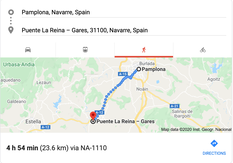 Today’s walk, from Pamplona to Puenta la Reina, would have been 24 km, including a steep ascent up to the wind turbines and the Alto del Perdón (the Pilgrim’s sculpture) outside Zariquiegui. (These names! I love them.) The Alto del Perdón, also known as the Mount of Forgiveness, features prominently in The Way, the Estevez-Sheen film about the Camino. It’s not that the act of walking, for most, is intrinsically difficult. (Wrap that knee and you’re good to go, girl!) When I look at the estimates on Google maps—although I’m sure I walk at a slower pace—it doesn’t look so difficult. Walk for five hours, with a break for second breakfast somewhere along the route? No problem. It becomes more difficult when it’s a daily thing, when the blister on the pinky toe doesn’t have a chance to heal, or the little twinge in the ankle becomes a bigger twinge, when the nights of not sleeping well begin to add up. Today would be the point, I imagine, when the newness wears off and the task ahead--nineteen more days of walking—becomes not an abstract plan on a spreadsheet but a hard and sometimes bitter reality. One tired foot in front of another for nineteen more days. ** The word “discipline” seemed apropos for this moment—but not quite. Because it’s early and my coffee hasn’t sunk in yet, also because there may have been a lot of wine consumed last night around our backyard firepit, I used the thesaurus to find what I was looking for. But the synonyms I found were even less right: “correction, chastisement, castigation, self-restraint, order, control, regulation, strictness, obedience, authority.” Nah. All of those seem too rigid to describe the experience of the Camino; they imply some external taskmaster, with a ruler or a whip, standing by to provide the necessary castigation. The Camino—a spiritual journey as much as a physical one—has to come from within. Real change always does, even if there’s an external spark. The heart has to be soft, malleable; the mind open. I thought I was going to write about writing today. That’s my discipline in real life, seven days a week when I open my laptop by six in the morning with a plan of what I’m going to accomplish: this scene, that chapter, twenty pages of revision, etc. Writing, like yoga, is a practice. Its goal is not so much perfection as the realization that comes with repetition, with daily, steady practice. Over time, the body becomes more limber, the muscles stronger. It’s the same with writing, although the muscles are skills being honed, the clarity is with how the story needs to go. (Maybe I am writing about writing after all.) ** A week or so ago, when the protests over George Floyd’s murder began to gain momentum, and when some of the protests became violent—I sat up, paid attention. I live in a little white bubble, not because I don’t know and love people of color, but because ultimately, I don’t—and can’t—have their same experiences. (One example: A few years ago, I tried to pay for a bagel at JFK with a counterfeit $10 bill. I didn’t know it was counterfeit; it had been passed to me with my change at the last place I shopped. Still—nothing happened to me. The police, who were surely everywhere in the terminal, weren’t called. I wasn’t detained for questioning. Certainly no one put a boot on my neck and held it there while I struggled for breath. The clerk simply passed it back to me and said, “Um, miss, this isn’t real.”) I posted on Facebook last week that I was looking to learn more about race in America, and my friends did not disappoint. This led to a chat with three of my colleagues about a text we wanted to read, and then an invite to an anti-racist book club. I’m exactly one chapter into White Fragility by Robin DiAngelo and feeling rocked-to-my-core convicted. This is me. She’s writing about me—well-intentioned but ultimately clueless. Here’s where it comes back to stamina, to the idea of practice. DiAngelo writes that white people (a generalization, but one created and validated through the structures of society) don’t have the stamina to talk about race. We don’t have the depth of knowledge necessary to sustain a complex conversation about race. We tend to fall back on individualism--but my experience! We become too easily offended--but not me! We deflect--but what about….? We become aggressive--who are you calling a racist? ** The walk is hard. It’s uncomfortable. It’s easier to do one five-hour commitment and be done with it than to put the shoes on your sore feet the next day to do it again. It’s easier not to examine myself, not to hear heartbreaking stories, not to accept hard truths. It’s easier to not begin a journey where you know you might stumble, fall, fail in a noticeable way. But if the heart is soft, the mind open, the practice can begin.
0 Comments
Leave a Reply. |
Paula Treick DeBoardJust me. Archives
December 2023
Categories |
 RSS Feed
RSS Feed